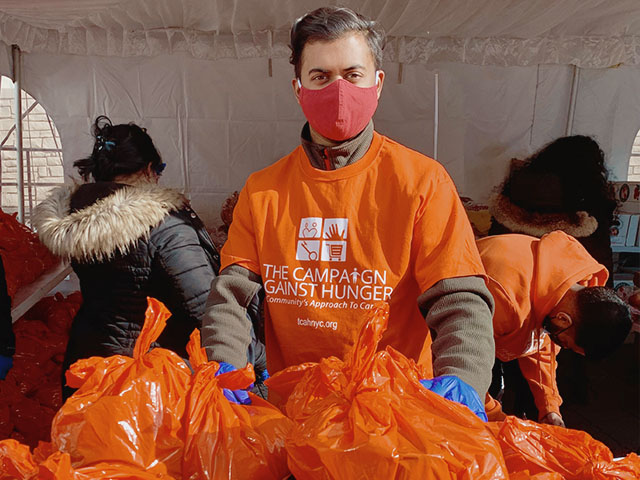Coronavirus attacking NYC’s food supply; Big Apple fighting back with $25 million for pantries

Here’s some food for thought: The global pandemic that is killing jobs, crippling the economy and upending the nation’s healthcare system is also making it harder for more and more people to get a decent meal.
Poor people in New York and across the nation were already bracing for new federal regulations that were scheduled to bounce hundreds of thousands of people off the food stamp rolls this month.
In the wake of the coronavirus outbreak, the White House shelved its plan to level strict work requirements on people using food stamps. But when the Trump administration backed off, the pandemic moved in, leaving families across the city scrambling for crumbs.
“What we’ve been seeing since COVID-19 is astronomical,” said Melony Samuels, director of Campaign Against Hunger, a food pantry in Crown Heights.
“The increase is because of loss of jobs, unemployment. We understand what it is. We know that even after things look like they’ve settled, there will still be a long line because families will not be adjusting yet.”

The mayor’s office did not have statistics on the increase in demand in the city’s pantries. But last week Mayor de Blasio and the City Council announced $25 million in emergency funding for pantries after about a third of them were forced to shut down in recent weeks, according to the Met Council on Jewish Poverty, one of the city’s biggest charities.
Samuels said the pantry expected to serve more than 6,400 households this week. She said more than 500 families were expected Tuesday, double the usual number.

De Blasio said the new funding will help fill their needs — and their plates.
“Whatever you need to feed people, you will get it,” de Blasio said during a visit Tuesday to the Brooklyn site. “People right now are afraid. This is like nothing we’ve experienced. Even if it’s one more person we have to reach, we’re going to reach that person, no matter what it takes.”
Stephanie Rodriguez, of Bushwick, was among the people standing in a long food line made even longer by social distancing. She said her family was reeling since she lost her job as a college assistant, and a relative died.
“The food will help us, for real,” she said. “The supermarkets right now — the prices are up for everything. This can help us throughout the whole time.”

Albany has also dedicated $25 million to food pantries.
De Blasio wasn’t the only one hitting the ground to make sure New Yorkers get meals. Members of the New York Army National Guard were at the Crown Heights pantry filling cars with take-away meals to be delivered to the elderly and others who can’t leave their homes.
The Big Apple’s food supply is just one front where New York City is waging war against the disease. The city is also making plans to kick coronavirus to the curb with a strategy to buy and produce 400,000 COVID-19 tests per month to monitor the virus, and make sure it doesn’t come back.

The city is partnering with universities, commercial laboratories and local manufacturers to make 50,000 COVID tests per week starting in May, de Blasio said. The city will also buy 50,000 tests per week from Illinois-based Aria Diagnostics starting April 20.
“If people can make them around the world, then why not us?” the mayor said. “Why couldn’t we make them, even if we’ve never done it before?”
The new strategy comes as city officials announced that coronavirus has killed more than 10,000 people in New York City, under a revised count that factors in “probable” cases that were previously excluded from the grim toll, according to the health department.

The new count includes 6,589 deaths of people who had tested positive for COVID-19, along with 3,778 individuals whose death certificates listed the virus as their cause of death even though there was no known test for them — making a total of 10,367 deaths as of Monday.





